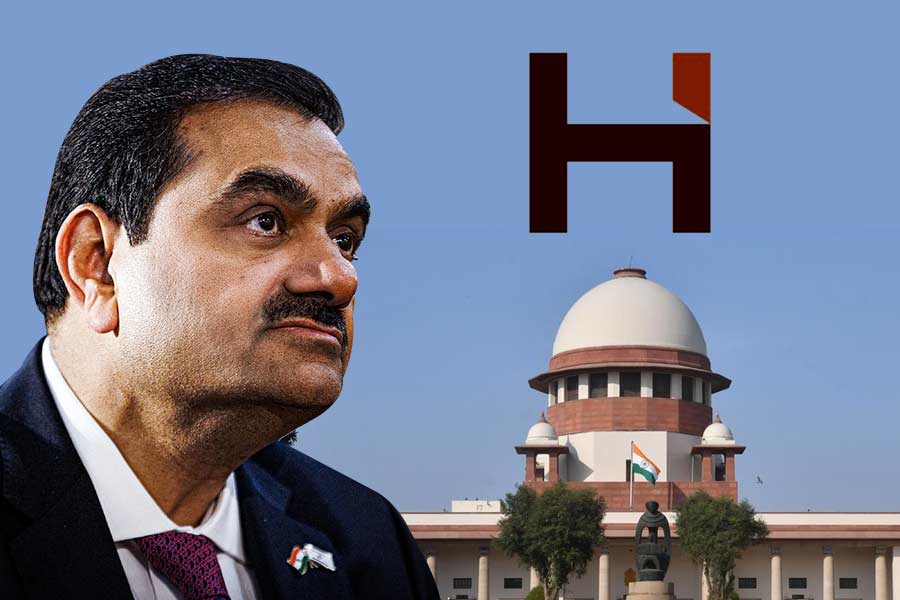Sebi To Present Final Report To Supreme Court On Adani Controversy; What Will Be The Investigation Findings?
The Securities and Exchange Board of India (Sebi) has reached a significant juncture in its investigation of the allegations put forth by US-based Hindenburg Research against the Adani Group. Sebi is poised to present its findings to the Supreme Court in what promises to be a conclusive report. This report delves into the heart of the matter, examining whether the Adani Group exploited regulatory gaps to influence share prices and whether it omitted the disclosure of transactions involving related parties. As the anticipation builds, the financial and legal communities eagerly await the revelations that could potentially shape the future terrain for one of India's most prominent conglomerates. Will Adani get a clean bill?

Sebi To Deliver Final Report On Adani Controversy To Supreme Court
The conclusive report on the Hindenburg Research accusations against the Adani Group is scheduled to be presented by India’s capital markets regulator, Sebi, to the Supreme Court.
Sources with knowledge of Sebi’s inquiry affirmed that this report marks the conclusion of their investigation. Although the specific findings remain undisclosed, Sebi’s investigation encompassed probing whether the Adani Group exploited loopholes in minimum public shareholding (MPS) regulations to manipulate share prices and whether it neglected to disclose transactions involving related parties.
The submission of this report is expected to take place early in the upcoming week. Informed insiders regarding Sebi’s investigation have stated that this will constitute the final report, signifying the conclusion of the regulator’s scrutiny.
Although the precise outcomes have not been confirmed, Sebi’s examination included an investigation into whether the Adani Group utilized loopholes within the minimum public shareholding (MPS) framework to manipulate share prices and if it neglected to disclose transactions involving related parties.

Will It, Won’t It?
Numerous sources suggest that the regulator’s inquiry is unlikely to unveil significantly adverse findings concerning the Ahmedabad-based conglomerate’s adherence to MPS norms. However, it is anticipated to reveal certain conclusions about the probe into transactions with related parties.
The deadline set by the Supreme Court for Sebi to finalize its investigation and present the report is August 14. The case is scheduled for a hearing on August 29.
The allegations pertaining to transactions involving related parties and MPS norms played a pivotal role in the Hindenburg report of January 24, which resulted in a substantial decline in the market capitalization of Adani Group’s publicly listed firms.
Sebi had previously pinpointed thirteen specific transactions for assessment, evaluating whether they could be categorized as related-party transactions under legal parameters.
)
Deloitte Calls It Quits
Meanwhile, over the weekend, the global auditing firm Deloitte Haskins & Sells concluded its six-year association with Adani Ports & SEZ. This decision stemmed from concerns about the feasibility of conducting thorough examinations into whether specific corporate dealings, including a transaction mentioned in the Hindenburg report, qualified as related-party transactions.
Deloitte cited Adani Ports’ reluctance to undergo an independent external assessment aimed at addressing the auditor’s concerns. Consequently, Deloitte issued a qualified opinion on the company’s fiscal results for 2023, indicating an audit report that does not meet pristine standards.
Minimum Public Shareholding
Sebi encountered challenges in its investigation of MPS-related matters due to the complexity of the dozen transactions highlighted in the Hindenburg report.
These transactions spanned various foreign jurisdictions, introducing complexities to the regulatory process, and as per reports, these overseas jurisdictions displayed limited cooperation in sharing details about foreign portfolio investors (FPIs) holding Adani Group shares.

Consequently, the regulator might not possess a robust case against the conglomerate, owned by India’s second-wealthiest individual, Gautam Adani.
FPIs constitute a segment of the non-promoter/public shareholder category within listed companies. According to Sebi, listed firms are required to maintain a minimum public shareholding of at least 25%.
Sebi’s initial suspicions revolved around the possibility that some public shareholders within Adani Group companies might not be genuine public stakeholders and could potentially serve as fronts for the promoters.
The basis for this suspicion lay in the opaque ownership structures of thirteen foreign entities (comprising twelve FPIs and one financial institution) holding Adani shares.
It was found that 42 investors from seven jurisdictions invested in these thirteen entities. Sebi sought ownership information for these 42 investors from various jurisdictions as part of its MPS-related investigation.
The Last Bit, The culmination of Sebi’s extensive investigation into the allegations against the Adani Group, marks a pivotal moment in the ongoing saga.
As the final report makes its way to the Supreme Court, industry stakeholders and observers eagerly await the outcomes that will shed light on whether the conglomerate navigated the regulatory landscape with integrity.
The report’s findings hold the potential to reshape perceptions and strategies not only for the Adani Group but also for the broader corporate community in India.
With the stage set for a decisive turn of events, the conclusions drawn by Sebi will undoubtedly resonate throughout the financial and legal realms, influencing discussions and decisions in the months to come.




